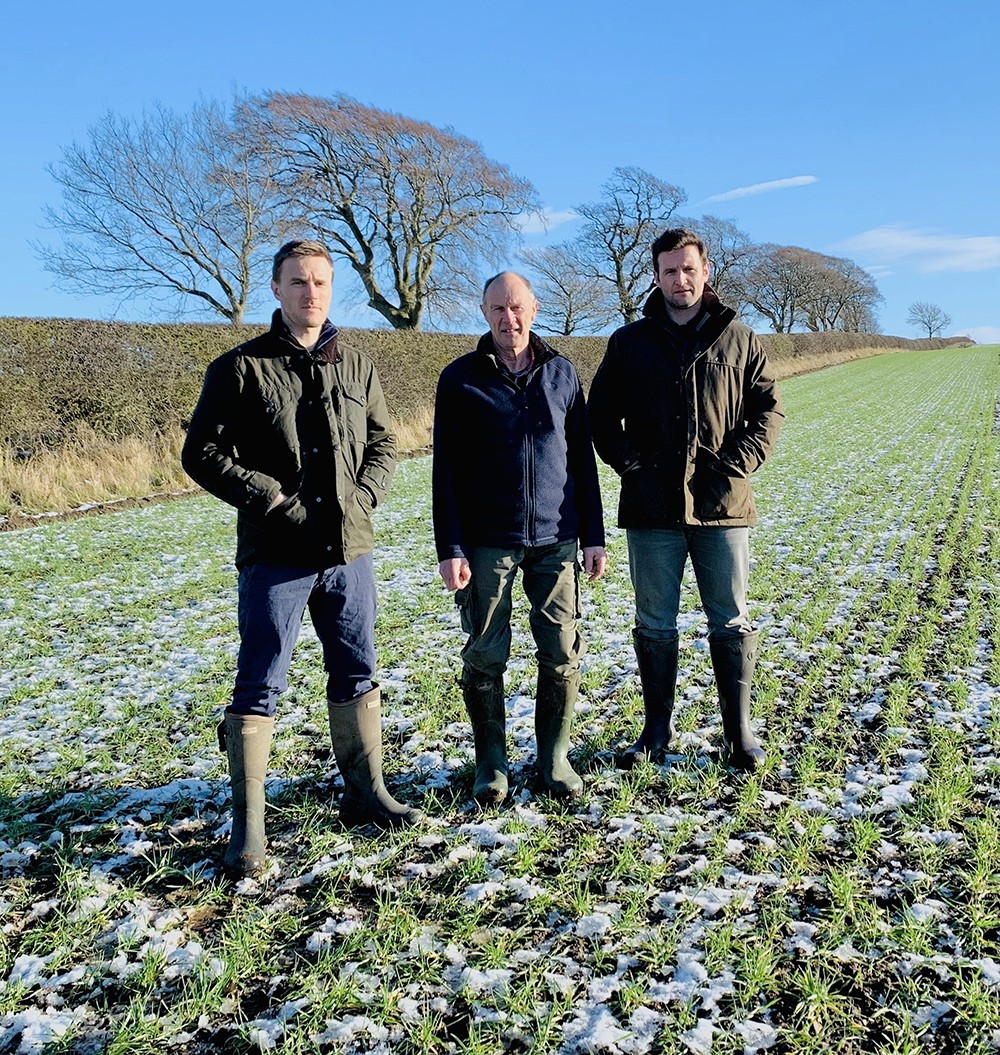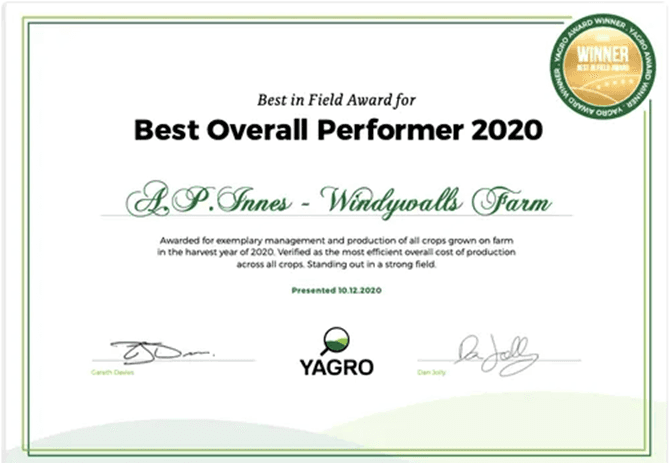Best Overall Performer 2020
RUPERT HARLOW
A.P. Innes Ltd. have been identified as the winners of our ‘Best Overall Performer Award 2020’; verified as the most efficient overall cost of production across all crops. A.P. Innes were also awarded the ‘Best In Field - Oilseed Rape’ for having the lowest overall cost of production for that crop. We spoke to Graham Innes to find out how they achieved this and what A. P. Innes have planned for the future.

Tell us about yourself.
I'm a chartered Civil Engineer and studied at university in Edinburgh before working in London for seven years. My brother Doug is in commercial property with various European projects. When we were younger, we were encouraged to pursue careers outside of farming as at that point; there was BSE, Foot and Mouth and grain prices were at a low. Due to the farm's size, we thought it would be tricky to support more than one of us. Doug and I both feel that having that external experience and bringing it back to the farm has been invaluable. I learnt so much from being in a high-pressure engineering environment that I would never have learnt on the day-to-day grind on the farm. I think the general business knowledge that we have acquired in our respective professions is proving invaluable and easily translatable to the farming industry, especially when it comes to tasks such as data analysis and business planning. We're both so grateful that we had that time away and that our parents encouraged us to do so.Tell us about the farm.We're a 3rd generation farm in the Tweed Valley, just to the south of Kelso, Roxburghshire. The farm itself is 230ha, with roughly 200ha of combinable crops and an additional 100ha of contract farmed land. We work with a loam soil throughout the farm, from sandy loam, some clay loam through to a gravely loam towards the River Tweed. We grow Winter Wheat, Winter Barley, Winter Oilseed Rape, Spring Barley, Spring Oats and Vining Peas. We also have 10ha of 3-year grass ley which we rotate across the farm and take one cut of silage from a year. The remaining 10ha is permanent pasture which we graze lambs and cattle on in the summer. My father (Clive) has been farming it for just over 40 years, and we've had our main tractor man (Andrew) for over 35 years, so as a team they've been consistent. Doug and I have been very privileged to come back to the farm in such a good state. The Farm200ha combinable cropsFamily farm run by Clive, Graham and Doug InnesCrops grown; Winter Wheat, Winter Barley, Winter Oilseed Rape, Spring Barley, Spring Oats and Vining Peas.The farm also has sheep and houses bed and breakfast cattle
How long have you been using YAGRO's services?
We started using YAGRO back in 2017 for the pricing and purchasing, predominantly for fertiliser, red diesel and road diesel. It's been a huge time saver as we haven't had to pick up the phone and call five different merchants for a quote. We then started using the agri-chemical pricing back in 2018, and when Analytics launched last year, we started utilising that as well.
Doug and I really see the value of data and its analytics, so finding YAGRO and analysing our data in such depth, in such an easy to use and digestible manner, has been great. I really enjoy being part of YAGRO's National Steering Group and helping steer the direction of the platform.
You've been identified as the Best Overall Performer 2020. You also have the lowest overall cost of production for your OSR, which is 60% lower than the YAGRO median.
Who do you credit for helping you with this?
A lot of the credit for the Best Overall Performer and the Oilseed Rape Award has to go to Clive and Andrew who’ve laid the foundations, though my brother and I would like to think that we've added to the success with a real focus on margins and cost management over the last few years. The team effort helps and considering it's a father and two sons we get on very well. Our Agronomist, Adam Bennet, has also been massively helpful in achieving this success. The communication between the four of us on the farm is vital.
Would you be willing to shed some light on how you achieved it?
As I said, my father and Andrew have worked tirelessly over the past few decades to lay the foundations for this. We're continuously improving and learning lessons. We look in detail at what did and didn't work last year to identify areas to drive efficiencies and productivity.
Attention to detail is essential at every stage of the process. We are very keen on soil sampling and soil analysis, and then we use that analysis for variable lime, phosphorous and potassium. We haven't used variable nitrogen, from what we have found we couldn't see a massive benefit in it and from what we've researched we can't justify it, so we don't use any. We bed and breakfast cattle in the winter which we feed the silage cut from the farm, which adds to our fertiliser inputs but provides valuable organic matter via the farm yard manure.
Another critical thing is choosing the right cultivation method. We like to min-till as much as possible, especially for our OSR but if it becomes too damp, we are happy to revert to the plough. Being in the south of Scotland, we haven't tried direct drilling, some farms around us do, and from what we understand, it's tricky to get things established well. We harvest that bit later than down south, giving us a narrower drilling window, which is heavily dictated to by the weather.
Varieties are very important for us, we're not shy to move away from a variety, but if it's working well, we'll stick with it. For OSR we are still growing Anastasia this year, and even though it's probably a bit long in the tooth we still managed to get over 5.5t/ha for one of our fields last year, it's continuing to do an excellent job for us - if it isn't broken, why fix it?
Your seed costs are very low; how do you achieve this?
Our seed rate is low; (40% lower rate than the YAGRO median and 61% lower than other published recommendations) therefore we don't need a large seed volume; we would like to try and get our seed rate even lower!
Apart from that, it's just making sure we buy our seed at the right price from the dealers. We do home save seed for Wheat and Spring Barley which is a massive saving as we have a more significant area with those two crops. We don't do it for OSR simply because it wouldn't be worth it. Trying to save 100-200 kilos and get it dressed etc. just doesn't make sense for us, so we do buy in seed for OSR.
The application of chemicals is the predominant thing that we'd like to alter. Removing an application entirely can have adverse effects, but reducing rates of the active ingredients is something we're keen to do. It's also keeping an eye on all the small elements, making those tiny little tweaks which make the big difference over time. We plan applications well ahead of fertilisers and sprays and then look at detail at the crop stage. Our agronomist, Adam, has helped do that. Having an independent agronomist is massively beneficial as we do not have to purchase from a specific company; we can buy what we want from whom we wish. Adam is very frugal and believes that if things don't need spraying, there is no point in just putting on chemical for the sake of it. My father Clive is even more frugal and doesn't always say yes to Adam's suggestions! It seems to be working, and our chemical spend is 17% lower than the YAGRO median with our fungicide spend being 19% lower, so we're happy to let them get on with that side of things.
We don't have any black-grass where we are, but we do have bromes which is becoming slightly more prevalent, and a justification for using the plough. It gets the seed down and buried, which helps keep the brome numbers down. We also utilise a wide, 7-year, rotation which we believe is a more sustainable strategy which enables us to better manage grass weeds.
What, if anything, are you doing differently next year?
Our primary focus for next year is to change our entry crop to Oilseed Rape. We're currently using malting Winter Barley, but that hasn't been working for us for the last few years. My father had been aware that it wasn't a great crop for us, but it wasn't until Doug, and I did some proper analysis and looked at it from a gross margin point of view that we realised that it was performing 12.2% worse as an entry crop than Spring Barley.
The other thing we're going to try for the first time is leaf tissue analysis. I know it has been around for a while but I'm looking forward to seeing what it produces and how we can use that information to improve what we're doing. We're also contemplating trying grain analysis, again it's very new, but we might give it a go and see how we can use that information to alter things moving forward.
We want to continue making things as precise as possible, so this will be the first year that we're utilising Omnia, a Hutchinson's programme. Omnia will give us an even greater depth analysis on soils, soil minerals and what we can do differently to improve and even things out.
How are you adapting to farming post-BPS?
The main thing is to continue doing what we're doing and keep doing it as well as we possibly can. We'll keep prioritising data collection, analysis and look at the refinement of our fixed and variable costs. When we do our annual budget, we look at it without BPS to see where we are, and where we can improve it to keep the gross margin up across the entire business. "We'll keep prioritising data collection, analysis and look at the refinement of our fixed and variable costs"
We're also focused on long-term soil health; it is a fairly hot topic right now. We want to build more sustainable soils across the farm increasing organic matter, enhancing fertility and improving the soils drainage and water retention properties. We have our farm manure and several straw-for-muck agreements to increase manure volume coming onto the farm and also work at evening out minerals across the fields.
Finally, expanding the business. We're keen to spread our fixed costs over a greater area to increase profitability and keep the business going forward. Things will only get tighter as BPS reduces, so we want to move those costs over a more significant area.
We're in two AHDB FarmBench groups, and we find it massively beneficial to compare with farms of all different sizes. I know that trying to get some farmers into those groups can be challenging, but the only way we're going to improve the whole industry will be by everyone pushing things forward and continually improving. For us, that is the only way to keep the business profitable in the future.
Congratulations to Graham on winning our Best Overall Performer 2020 award.
